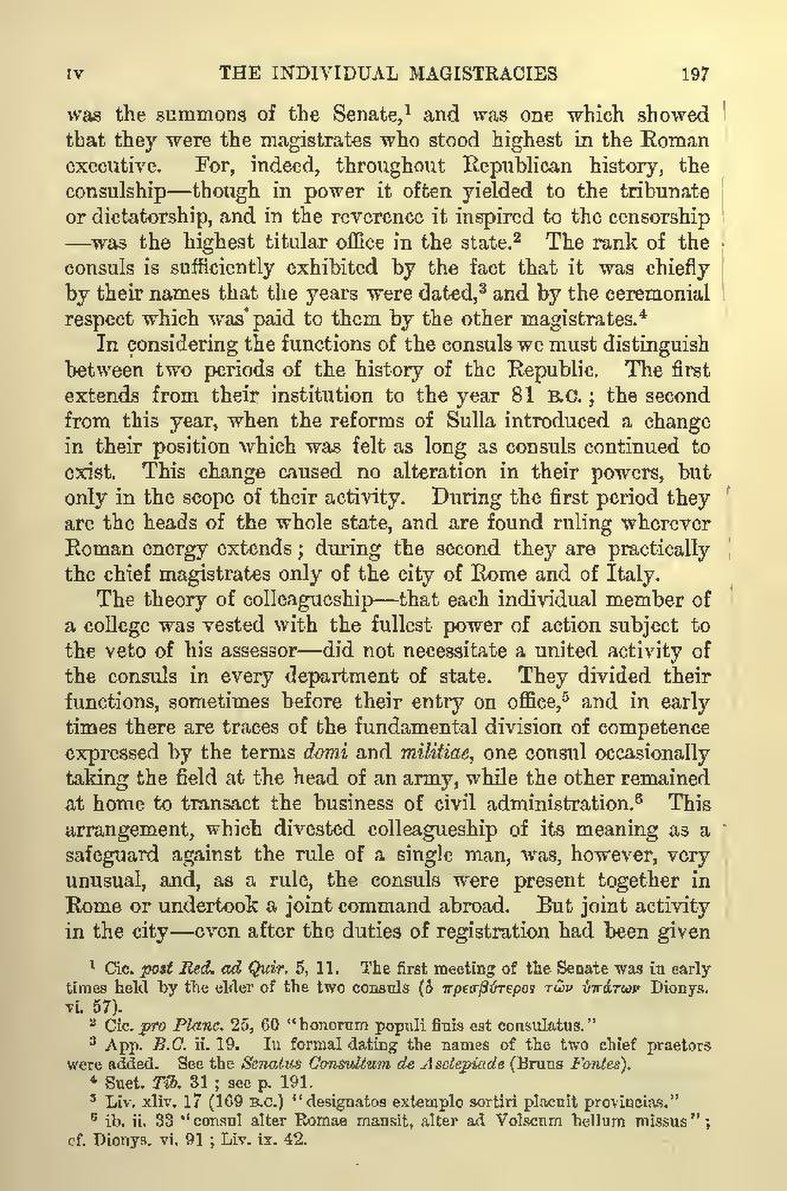was the summons of the Senate,[1] and was one which showed that they were the magistrates who stood highest in the Roman executive. For, indeed, throughout Republican history, the consulship—though in power it often yielded to the tribunate or dictatorship, and in the reverence it inspired to the censorship—was the highest titular office in the state.[2] The rank of the consuls is sufficiently exhibited by the fact that it was chiefly by their names that the years were dated,[3] and by the ceremonial respect which was paid to them by the other magistrates.[4]
In considering the functions of the consuls we must distinguish between two periods of the history of the Republic. The first extends from their institution to the year 81 B.C.; the second from this year, when the reforms of Sulla introduced a change in their position which was felt as long as consuls continued to exist. This change caused no alteration in their powers, but only in the scope of their activity. During the first period they are the heads of the whole state, and are found ruling wherever Roman energy extends; during the second they are practically the chief magistrates only of the city of Rome and of Italy.
The theory of colleagueship—that each individual member of a college was vested with the fullest power of action subject to the veto of his assessor—did not necessitate a united activity of the consuls in every department of state. They divided their functions, sometimes before their entry on office,[5] and in early times there are traces of the fundamental division of competence expressed by the terms domi and militiae, one consul occasionally taking the field at the head of an army, while the other remained at home to transact the business of civil administration.[6] This arrangement, which divested colleagueship of its meaning as a safeguard against the rule of a single man, was, however, very unusual, and, as a rule, the consuls were present together in Rome or undertook a joint command abroad. But joint activity in the city—even after the duties of registration had been givenDionys. vi. 57).]
- ↑ Cic. post Red. ad Quir. 5, 11. The first meeting of the Senate was in early times held by the elder of the two consuls ([Greek: ho presbyteros tôn hypatôn
- ↑ Cic. pro Planc. 25, 60 "honorum populi finis est consulatus."
- ↑ App. B.C. ii. 19. In formal dating the names of the two chief praetors were added. See the Senatus Consultum de Asclepiade (Bruns Fontes).
- ↑ Suet. Tib. 31; see p. 191.
- ↑ Liv. xliv. 17 (169 B.C.) "designatos extemplo sortiri placuit provincias."
- ↑ ib. ii. 33 "consul alter Romae mansit, alter ad Volscum bellum missus"; cf. Dionys. vi. 91; Liv. ix. 42.
